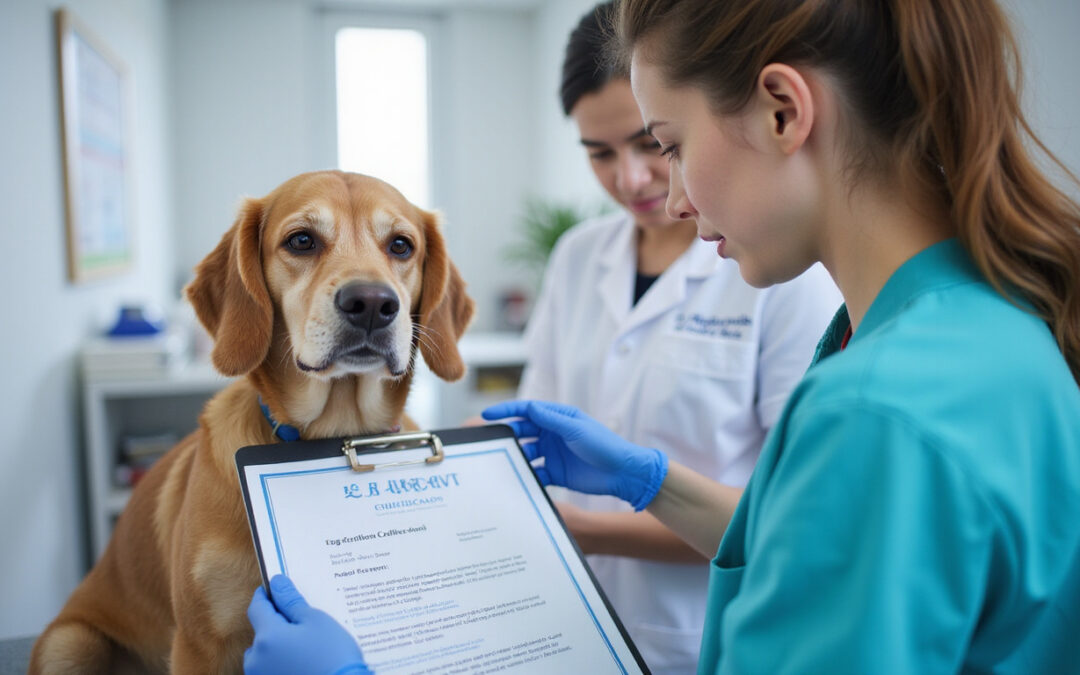
BLOG
As a licensed veterinary technician, you must know the LSB-RVT renewal process. Keeping your license current lets you care for animals well and stay in practice. Each word in this guide connects smoothly to help you learn fast and clear.
In this guide, we show you the steps, rules, deadlines, education needs, fees, and pitfalls. By the end, you see a clear path to renew without stress.
What is the LSB-RVT Renewal Process?
The LSB-RVT renewal process is set by the Louisiana State Board of Registered Veterinary Technicians. This process makes sure you meet the new rules and training needs. Every two years, you must renew your license. Renewal helps you stay updated on animal care, ethics, and public health.
Who Needs to Complete the LSB-RVT Renewal Process?
Every licensed veterinary technician in Louisiana must renew before the license expires. If you do not renew, you may face:
• An expired license
• Penalties or late fees
• Suspension or cancellation of the license
• Loss of legal work status
New graduates should check their first renewal deadline to avoid any gap in licensure.
Key Steps in the LSB-RVT Renewal Process
Here is a step-by-step guide to the LSB-RVT renewal process:
1. Check Your License Expiration Date
Find the expiration date on your license or notice. Mark the date on your calendar. Set reminders so you do not miss it.
2. Complete Required Continuing Education (CE)
The board needs you to earn new skills through continuing education. You must complete 24 hours every two years. At least 2 hours cover ethics or professional responsibility. You must use approved CE courses. Keep your certificates safe.

3. Complete the Renewal Application
Fill the application online or mail it as required by the Board. Verify that your personal and professional details are correct. Update your contact information.
4. Pay the Renewal Fee
Pay the fee to complete the renewal. The fee amount can change. Check the board’s website for the latest fee. Payment can be made by credit card, electronic check, or money order. Save your payment confirmation.
5. Submit Any Additional Documentation
Some cases need extra documents, such as:
• Proof of CE completion
• Disciplinary disclosures (if needed)
• Criminal background checks (if required)
6. Confirm Renewal Approval
After the board processes your application, you get a confirmation. Some technicians get a physical license by mail, while others receive a digital version.
Continuing Education Tips for LSB-RVT Renewal
Continuing education can take time. Here are a few tips:
• Plan early. Earn CE credits soon after your last renewal.
• Choose topics that improve your daily tasks or match new trends.
• Use accredited providers. Check that courses are approved by the board or respected organizations.
• Keep your records clear and organized. Save a copy of each certificate and course detail.
Common Challenges in the LSB-RVT Renewal Process
Sometimes, the process brings challenges:
Missed Deadlines
Deadlines must be met. Missing them may lead to late fees or a harder reinstatement process.
Incomplete CE Documentation
If your CE records are incomplete, your renewal may be denied.
Fee Payment Issues
Make sure your fee payment goes through. Keep the receipt safe to avoid record errors.
What to Do if You Miss Your LSB-RVT Renewal Deadline
If you miss the deadline, do not panic. Follow these steps:
• Check if a grace period is allowed. Some states allow a short window.
• Pay the late fees as soon as possible.
• Send all required documents soon.
• If your license lapses, you might need to reinstate it with extra fees and possibly more CE.
Check the official Louisiana State Board website for the latest rules.
Frequently Asked Questions About the LSB-RVT Renewal Process
1. How often must I complete the LSB-RVT renewal process?
Renew your Louisiana veterinary technician license every two years to stay current with the board.
2. What continuing education hours are required for LSB-RVT renewal?
You need 24 CE hours every two years. At least 2 hours must focus on ethics or professional responsibility, and these hours must be approved.
3. Can I renew my LSB-RVT license online?
Yes, the board offers an online portal. You can submit your application, upload documents, and pay fees securely.
Final Thoughts: Stay Ahead with the LSB-RVT Renewal Process
Keeping your license active through the LSB-RVT renewal process protects your career. Renew on time with complete documents and CE credits so you can care for animals without interruption.
For the latest on deadlines, fees, and instructions, always visit the official Louisiana State Board website. Stay informed and renew smoothly each cycle.
References:
- Louisiana State Board of Veterinary Medicine official website: lsbvm.org (source)

BLOG
For businesses in Louisiana that sell, serve, or distribute alcohol, knowing the rules matters. The state requires an alcohol compliance course. This course educates owners, managers, and staff on state laws, safe service, and reducing risks. In this article, we explain what the course covers, why it matters, who must take it, and how to enroll.
What Is the Alcohol Compliance Course Louisiana?
The course is a required program for those who handle or sell alcohol. It helps people learn their legal duties. You learn to check IDs, serve responsibly, spot intoxication, and follow state rules. The Louisiana Office of Alcohol and Tobacco Control (ATC) enforces these laws. The course helps you avoid fines, penalties, and license problems. Often, you must finish the course to get or renew an alcohol license.
Why Is Taking an Alcohol Compliance Course Important?
Alcohol incidents can hurt a business. They may lead to legal issues, financial loss, and bad publicity. The course helps by:
- Helping staff follow the law.
- Reducing risks of lawsuits.
- Keeping the community safe.
- Ensuring you keep your license.
Thus, the course is a key part of practicing safe and legal alcohol service.
Who Needs to Take the Alcohol Compliance Course in Louisiana?
Not everyone in a business must take the course. The course is for people who work closely with alcohol. Typically, you need the course if you are:
- A business owner or manager with an alcohol license.
- A bartender or server who handles drinks.
- Security staff or doormen who check IDs or watch for over-serving.
- A trainer who teaches others about safe service.
When your business holds a permit to sell alcohol, make sure your team is trained.
Key Topics Covered in an Alcohol Compliance Course Louisiana
The course teaches practical subjects and legal points. Main topics include:
- State Alcohol Laws – Learn the rules about selling alcohol.
- Age Verification and ID Checking – See valid IDs and stop sales to minors.
- Preventing Over-Service – Spot intoxication and serve safely.
- Liability and Legal Consequences – Understand risks when rules are broken.
- Serving Responsibly – Follow best practices for serving.
- Record Keeping and Reporting – Know how to document sales and incidents.
Participants gain practical tips for daily tasks.
How to Enroll in an Alcohol Compliance Course Louisiana
Enrollment is simple. The ATC lists approved training providers. You can choose online or in-person courses.
Steps to Enroll:
- Check if your business or staff need certification.
- Select an ATC-approved course that fits your plan.
- Register and finish the course.
- Get your certificate to show regulatory authorities.
Many courses offer flexible times and online options to help businesses across the state.

Common Alcohol Licensing Types in Louisiana
It helps to know the types of alcohol licenses from the ATC. These licenses include:
- Class A (Beer and Light Wine License) for retailers.
- Class B (Beer, Wine, and Liquor License) for bars, restaurants, and stores.
- Special Event Permits for festivals or temporary events.
- Manufacturer and Distributor Licenses for producers and distributors.
Each license type may have its own training needs.
Tips for Maintaining Alcohol Compliance in Your Business
Beyond the course, uphold safe practices. You can:
- Train new staff on alcohol laws right away.
- Bring back staff for regular refresher classes.
- Make clear policies for serving alcohol safely.
- Stay updated with any law changes.
- Always check IDs carefully.
- Report any signs of trouble or rule breaches.
These steps help create a culture of safety and legal practice.
FAQs About Alcohol Compliance Course Louisiana
Q1: How often must businesses in Louisiana complete the course?
Most rules need the course when you apply or renew your license. Some experts advise a refresher every 1-3 years.
Q2: Can the course be taken online?
Yes, many ATC-approved vendors offer online courses that cover all the topics and offer certification.
Q3: What happens if a business does not follow Louisiana’s alcohol laws?
Violations can lead to fines, license suspension, or legal action. The course helps reduce these risks.
For Louisiana businesses, the alcohol compliance course is a key step. It protects you legally and supports community safety.
Understanding the alcohol compliance course is essential for any business managing alcohol. With the right training and practices, your business can follow the rules and grow with confidence. For the latest details, visit the Louisiana Office of Alcohol and Tobacco Control’s official site.

BLOG
Ensuring alcohol service compliance matters for every business that serves drinks. It keeps customers safe and stops legal and reputational harm. Bars, restaurants, and event venues all must follow strict rules. This article gives clear tips so businesses can serve alcohol safely and follow the law.
Understanding Alcohol Service Compliance
Alcohol service compliance means following the laws that control the sale and service of drinks. These rules stop illegal sales, underage drinking, and overconsumption. Staff must learn the law, gain proper training, and act ahead. Local, state, and federal rules vary. Breaking them can bring fines, lost licenses, or criminal charges.
Why Alcohol Service Compliance Matters
Compliance helps businesses in many ways:
- Legal Protection: Follow the law to avoid fines, lawsuits, and losses of license.
- Promoting Safety: Cut risks linked to too much drinking.
- Enhancing Reputation: Show customers that you act responsibly.
- Community Responsibility: Help public health by stopping underage drinking.
Clear guidelines and steady training give staff the tools to follow alcohol laws.
Essential Tips for Achieving Alcohol Service Compliance
1. Comprehensive Staff Training
Train every employee who sells or serves alcohol. Good training helps staff to:
- Check IDs to prevent underage sales.
- Spot signs of intoxication.
- Refuse service firmly in tough situations.
- Know local legal rules.
Many places need certified training. This increases staff skills and may be a legal must.
2. Strict ID Verification Procedures
Always check customer IDs. Simple, clear ID checks stop sales to minors:
- Train staff to check government IDs for signs of authenticity.
- Use electronic checks if you can.
- Refuse any ID that looks wrong.
- Post signs to remind customers about ID rules.
3. Establish and Enforce Responsible Serving Policies
Make rules that encourage safe alcohol service. These rules can include:
- Serving a limited number of drinks at a time.
- Stopping service to clearly intoxicated customers.
- Offering food or non-alcoholic drinks as a choice.
- Using tools to monitor sales and pours.
Keep these rules clear and enforce them every time.

4. Keep Up with Local Laws and Licensing Requirements
Rules change often. Stay smart by:
- Checking local government websites and industry guides.
- Getting advice from legal experts or compliance teams.
- Renewing licenses on time and keeping all papers.
- Attending workshops or seminars.
Being updated stops accidental violations.
5. Monitor and Document Compliance Activities
Keeping a record shows you follow the law:
- Save records of training dates and who was in class.
- Write down any incidents when service was refused.
- Track inventory to spot any wrong moves.
Good records help during inspections or if questions arise.
6. Utilize Technology for Compliance Support
Modern tools can help:
- Use point-of-sale systems with age checks.
- Keep cameras to watch service areas.
- Use software to track inventory and sales.
These tools cut errors and keep clear records.
Alcohol Service Compliance Checklist for Businesses
Here is a simple checklist to follow:
- Train all staff regularly on alcohol service rules.
- Check every customer’s ID carefully.
- Set and enforce safety rules when serving alcohol.
- Stay up-to-date with laws and license rules.
- Keep detailed records of training, service, and stock.
- Use technology to support compliance.
- Display clear signs about alcohol service and ID checks.
- Build a culture of responsibility among employees.
Frequently Asked Questions About Alcohol Service Compliance
Q1: What age must I verify to meet alcohol service laws?
A1: The legal age changes by country. It is often 18 or 21. Check your local law before serving alcohol.
Q2: How often must staff get alcohol service training?
A2: Training happens at onboarding and again periodically. Most places update annually to refresh skills and share new rules.
Q3: Does refusing service to intoxicated customers protect my business?
A3: Yes. Stopping service to clearly intoxicated customers is a key rule. It also helps your business avoid legal risks.
Final Thoughts
Following alcohol service compliance rules is not a burden but a smart practice for any business. With proper training, careful ID checks, responsible serving, and ongoing learning, businesses protect themselves and their customers. A strong commitment to compliance supports safety, reputation, and long-term success.
For more guidelines, consult resources like the National Institute on Alcohol Abuse and Alcoholism or local government websites.
Using these tips, your business can do well while serving alcohol safely and smartly.

BLOG
Creating a safe work space stays a top goal. Every firm needs to keep work safe. Alcohol misuse, a known risk, can harm safety. Companies use clear steps to cut accidents, boost well-being, and keep work smooth. This piece shows clear ways to handle alcohol risk so work stays safer.
Understanding Alcohol Risk Management
Alcohol risk management means setting up clear policies and steps. Firms build rules to spot and cut alcohol risks. These rules cover drinking on the job and the harm alcohol misuse can cause, like poor work, missed days, and accidents.
Managers must care for workers. They build a culture that puts safety first. Good alcohol risk plans help meet laws, keep workers safe, and lead to better healthy habits.
Importance of Alcohol Risk Management in the Workplace
Work places can be risky. Alcohol use makes hazards worse. The National Safety Council notes that alcohol often leads to work injuries (source). Alcohol misuse can cause:
- Less concentration and slower reactions
- Poor decision-making
- Risky behavior
- More absences and less output
- More conflicts and fights
By managing these risks early, companies protect workers and save money from accidents, lost work, and legal issues.
Key Strategies for Effective Alcohol Risk Management
Strong alcohol risk management uses many parts: clear rules, worker training, support plans, and rule checks. Firms should use these key steps:
1. Develop and Enforce a Clear Alcohol Policy
A strong policy is the base for safety. The policy must state:
- What no-drinking means during work and while working for the firm
- What happens if the rules break
- Steps to handle alcohol issues
- Help for workers with alcohol problems
Clear words and steady meetings build a culture of care.
2. Conduct Regular Risk Assessments
Regular checks help spot alcohol risks. These look at the work type, worker needs, and past issues. Firms then tailor their steps to meet each risk.
By addressing specific workplace conditions and employee factors, companies can better prevent incidents linked to alcohol misuse.

3. Provide Employee Education and Awareness Programs
Teaching workers about alcohol risks is key. These programs share:
- How alcohol affects mind and body
- The firm’s rules and the cost of breaking them
- Where to find help and treatment
Workers who learn well tend to choose safe paths and help peers stay safe.
4. Implement Employee Assistance Programs (EAPs)
EAPs give private help to those with alcohol troubles. Easy access to support spurs quick help and recovery, which aids both workers and the firm.
5. Conduct Workplace Testing When Appropriate
In high-risk jobs, testing for alcohol is important. Such tests follow laws and respect workers to build trust.
6. Promote a Supportive Workplace Culture
A kind work space lets workers talk about problems without fear. Leaders act as role models and support strong measures against alcohol risks.
Sample Alcohol Risk Management Implementation Plan
- Create a mixed team to write and check the alcohol rules.
- Share the policy in training, on intranets, and in meetings.
- Plan risk checks twice a year to catch new risks.
- Start a learning campaign on alcohol impacts and safe choices.
- Set up or boost EAPs for private help with alcohol issues.
- Decide on testing based on check results and law.
- Train managers to spot alcohol issues and act with care.
- Review results each year and fine-tune the plan.
Benefits of Robust Alcohol Risk Management
Good alcohol risk plans bring many wins:
- Safer work and fewer accidents
- Better work results and output
- Fewer days lost and lower worker turnover
- Clear law following on health and safety
- A good firm image and high team spirit
Investing in these steps shows a firm cares for its people and works well.
Frequently Asked Questions (FAQ)
What is alcohol risk management in the workplace?
It means having rules and plans to spot, stop, and fix alcohol problems at work.
How can companies reduce alcohol-related risks at work?
Firms cut risks by using clear rules, regular checks, worker training, support plans like EAPs, and fair testing when needed.
Why is alcohol risk management important for workplace safety?
Alcohol clouds judgment and slows body response. Cutting these risks keeps work safe, meets safety laws, and upholds work quality.
Conclusion
Managing alcohol risks is key for safe, healthy work. With clear rules and strong support, firms can cut alcohol risks and boost a safety-first work feel. Regular checks and updates keep these plans sharp.
By caring for alcohol risks, firms protect workers and build a stronger, more reliable future.

BLOG
If you serve alcohol or work in hospitality, you must renew your alcohol permit on time. Renewing a permit may seem complex and long. Yet the right steps can make it quick and keep your business compliant.
In this article, we show clear steps that bring each task closer. These steps save you time and help you avoid common errors. Whether this is your first renewal or you renew often, these tips keep the steps short and connected.
────────────────────────────────────────
Understanding Alcohol Service Permit Renewal
At its core, an alcohol service permit gives you legal permission to serve drinks. Local rules make you renew it—often once a year or every few years. Renewals need you to update your papers, pay fees, and sometimes complete training. If you miss a deadline or send partial forms, it can delay your permit and cause penalties that hurt your business.
────────────────────────────────────────
Why Simplifying Your Renewal is Crucial
Keeping the process simple helps you avoid these risks:
• Your business stops when permits expire.
• Fines and penalties become unnecessary.
• You face less paperwork and irritation.
• You stay in line with current laws and standards.
A clear, quick renewal lets you serve customers and grow your business.
────────────────────────────────────────
Tips to Simplify Your Alcohol Service Permit Renewal Process Quickly
────────────────────────────────────────
1. Keep Track of Deadlines
Set a clear calendar reminder. Mark your renewal date ahead of time. Use alerts that come closer to the date. This way, you gather your papers with time to spare:
• Use your digital calendar on your phone or computer.
• Set alerts for 60, 30, and 7 days before the deadline.
• Tell team members the renewal date, too.
────────────────────────────────────────
2. Organize All Required Documentation
Permit renewals need specific forms such as:
• The completed application.
• Proof of identity or business registration.
• The previous permit certificate.
• Payment for all fees.
• Training certificates if needed.
Keep these files in one place—a folder on paper or your computer. This close grouping of words and tasks cuts delays due to missing files.
────────────────────────────────────────
3. Complete Necessary Training Early
Many rules require you or your staff to get alcohol server training before renewal. Start your training early. This plan removes stress and prevents a stop in the process due to incomplete training. Look online for approved trainers or ask your licensing office for updated rules.

────────────────────────────────────────
4. Use Online Filing Systems
Many places now let you renew online. Online systems can make the process faster because they:
• Let you fill forms and pay fees online.
• Give you instant confirmation.
• Lower the chance of lost paperwork.
Check your local website to see if they offer online renewal. Create your account and be ready before you start.
────────────────────────────────────────
5. Consult Official Resources
Visit government websites or call support to clear up any doubts about the rules. These sources give you checklists, FAQs, and clear renewal steps. For example, the Alcohol and Tobacco Tax and Trade Bureau (TTB) shows that knowing updated laws makes renewals smoother.
────────────────────────────────────────
6. Delegate the Task
If you can, ask a trusted staff member to handle the renewal. This division of tasks stops the renewal from being lost in busy work.
────────────────────────────────────────
7. Double-Check Everything Before Submission
Review every form, fee, and document before you send your application. Checking closely means fewer mistakes and a faster approval.
────────────────────────────────────────
Benefits of Simplifying the Renewal Process
• Minimal disruptions when permits expire.
• Less stress and paperwork.
• A lower risk of fines or penalties.
• Easier compliance with alcohol service laws.
• More time to focus on your business.
────────────────────────────────────────
Quick Alcohol Service Permit Renewal Checklist
- Mark your renewal date in your calendar with advance reminders.
- Gather and organize all needed documents and previous permits.
- Finish any required training early.
- Set up and use an online filing system if available.
- Check the official licensing website for updates.
- Delegate the task to a reliable person.
- Review all parts of your application before submission.
- Pay fees quickly and save your receipts.
────────────────────────────────────────
FAQ About Alcohol Service Permit Renewal
Q1: How often do I need to renew my permit?
A: Renewal times vary by state and local rules. In many areas, it is once a year or every few years. Check with your local authority to be sure.
Q2: Can I renew my permit online?
A: Many places offer online renewals. Check your local website for details and instructions.
Q3: What if I miss the renewal deadline?
A: Missing a deadline can make your permit expire, and you could face fines, penalties, or even closure until you renew. Always mark your renewal date clearly.
────────────────────────────────────────
Final Thoughts
Renewing your alcohol service permit does not need to be long or hard. Plan ahead, keep your documents close, complete training early, and use online tools to keep things clear and fast. Staying compliant helps your business run smoothly and protects your reputation.
For the latest details and new rules, visit the local alcohol control board’s website or the Alcohol and Tobacco Tax and Trade Bureau’s site (TTB). These clear steps and tools help make your permit renewal one less worry in your busy schedule.

BLOG
In today’s world, work changes fast. Staying on top of new facts and skills is key. A renewal course refreshes what you know. It updates and expands your expertise. Whether you are an experienced worker or just starting out, these courses help you learn and grow.
This article gives you simple renewal course tips. We explain how to choose a course, why learning every day matters, and ways to add new training to your work plan.
What Is a Renewal Course and Why Does It Matter?
A renewal course is a short training or workshop that brings you up to date. It updates you on new standards, tools, or methods. Many jobs require these courses to keep your license or certificate active. They help you grow, too, by keeping you aware of change.
When you join a renewal course, you show your skill and commitment. You also show bosses and peers that you value learning. Staying current is a big part of being ready for work.
Benefits of Taking a Renewal Course
Renewal courses give you many gains:
- Skill Enhancement: You get fresh tools and new facts.
- Professional Credibility: You keep your certificates up to date.
- Career Advancement: You boost your chance for a raise or promotion.
- Networking Opportunities: You link up with experts in your field.
- Confidence Boost: You feel sure of your skills and ideas.
These courses exist in many fields—health, education, IT, law, project management, and more. They help workers in many jobs.
How to Choose the Right Renewal Course for Your Career
Pick a renewal course with care. Use these steps:
- Match Your Career Goals: Choose a course that fits what you want to do. If you aim to lead, look for courses in management or communication.
- Look at Accreditation: Make sure the course is approved by trusted groups.
- Decide on the Format: Pick a course that is in-person, online, or mixed. Choose what suits your time and style.
- Review Content: Check that the course covers the newest trends and tools.
- Check Duration and Flexibility: Choose a course that fits your work and life.
- Weigh Cost and Value: Look at the fee and match it with the benefits.
Top Strategies to Maximize Your Renewal Course Experience
Signing up is only the start. Use these tips to get the best results from your course:
1. Set Clear Goals Before Starting
Write down what you want to learn. Do you need to refresh technical facts, prepare for a test, or build soft skills? Clear goals keep you on track.
2. Actively Participate and Engage
Join in all discussions, finish every task, and talk with your teachers and peers. Acting now builds your skill and network.
3. Apply Learning Immediately
After each lesson, use your new skills at work. Showing your boss what you can do helps build trust.
4. Take Notes and Create Resource Materials
Write down key points and good links. A short guide you make will help you later.

5. Seek Feedback and Reflect
Ask your mentor or coworkers how well you use your new skills. Think about where you can do better.
6. Plan Continuous Learning Beyond the Course
See this course as one step in your learning life. Arrange a plan for more training or self-study to keep growing.
Practical Ways to Incorporate Renewal Courses Into Your Career Growth Plan
Renewal courses can boost your career when added to a clear plan. Try these tips:
- Plan Ahead: Mark when your certificate needs a refresh. Sign up early to avoid stress.
- Use Employer Support: Many companies pay for training. Ask HR for help.
- Balance Work and Study: Set aside a few hours each week for your course.
- Sync With Career Milestones: Tie your course to job reviews or promotion times.
- Share Your Achievements: Update your resume and career pages with your new skills.
- Explore New Interests: Sometimes, take a course that adds to your main skills.
Example List: Popular Renewal Course Options by Profession
Here are some examples:
- Healthcare Professionals: Courses like Continuing Medical Education (CME) or Basic Life Support (BLS) refreshers.
- Educators: Updates on teaching methods or special education training.
- IT Specialists: Cybersecurity updates or cloud technology courses.
- Project Managers: Renewal for PMP (Project Management Professional) or agile methods.
- Legal Practitioners: Continuing Legal Education (CLE) or ethics refreshers.
- Law Enforcement: Training on use of force or legal updates.
Renewal Course Success Stories and Real-World Impact
Many workers share clear success from renewal courses. For example, a project manager who refreshed PMP skills could manage tougher projects and got a promotion. Teachers who joined renewal courses felt more sure when using digital tools in class and saw higher student care.
Frequently Asked Questions (FAQ)
Q1: What is the difference between a renewal course and a refresher course?
They both update you. A renewal course is often needed to keep a license valid. A refresher course is more for extra practice and might not give formal credit.
Q2: How often should I take renewal courses?
This depends on the rules of your job. Many careers ask for a course every one to three years. Check your certificate rules.
Q3: Can renewal courses be completed online?
Yes. Many courses are online. They give you the chance to learn when it suits you.
Conclusion: Make Your Renewal Course Count
A good renewal course is a smart choice for your future. It sharpens your skills, keeps your certificates valid, and opens new job chances. Pick a course that suits you and use a clear plan to learn well. Stay current and strong in today’s fast work world. Taking these steps lets you grow alongside your career.
Keep learning through renewal courses. They are not just a way to maintain your license—they help you shine in a changing work world. Use these tips now to reach your best self.
For more on professional growth and keeping certifications active, see resources from groups like The Project Management Institute (PMI) or your industry association.













